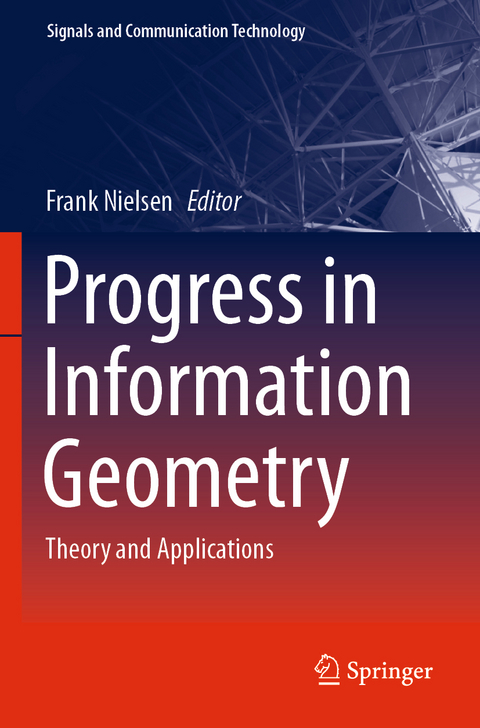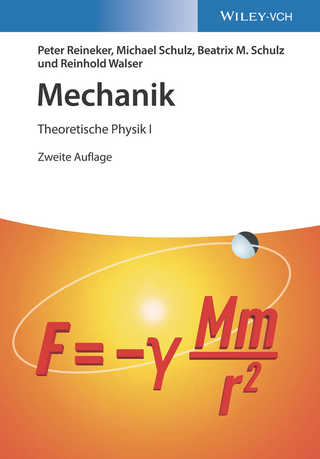
Progress in Information Geometry
Springer International Publishing (Verlag)
978-3-030-65461-0 (ISBN)
This book focuses on information-geometric manifolds of structured data and models and related applied mathematics. It features new and fruitful interactions between several branches of science: Advanced Signal/Image/Video Processing, Complex Data Modeling and Analysis, Statistics on Manifolds, Topology/Machine/Deep Learning and Artificial Intelligence. The selection of applications makes the book a substantial information source, not only for academic scientist but it is also highly relevant for industry.
The book project was initiated following discussions at the international conference GSI'2019 - Geometric Science of Information that was held at ENAC, Toulouse (France).
lt;p>Frank Nielsen is Senior Researcher at Sony Computer Science Laboratories Inc, Tokyo, Japan and a fellow of the European Laboratory for Learning and Intelligent Systems (ELLIS). He taught at Ecole Polytechnique (Palaiseau, France) visual computing and high performance computing (HPC) for data science. His research aims at understanding the nature and structure of information and variability in data and exploiting algorithmically this knowledge in innovative imaging and machine learning applications. For that purpose, he coined the field of computational information geometry (computational differential geometry) to extract information as regular structures while taking into account variability in datasets by grounding them in geometric spaces. Geometry beyond Euclidean spaces has a long history of revolutionizing the way we perceived reality. Curved spacetime geometry sustained relativity theory and fractal geometry unveiled the scale-free properties of nature. In the digital world, geometry is data-driven and allows intrinsic data analytics by capturing the very essence of data through invariance principles without being biased by any particular data representation. He is an editor of the journal Entropy (MDPI) and of the journal Information Geometry (INGE, Springer), and co-organize the biannual internation conference on the Geometric Sciences of Information (GSI).
Information Geometry of smooth densities on the Gaussian space: Poincare inequalities.- On Normalization Functions and -families of Probability Distributions.- Affine Connections with Torsion in (para-)complexified Structures.- Contact Hamiltonian systems for probability distribution functions and expectation variables: A study based on a class of master equations.- Invariant Koszul Form of Homogeneous Bounded Domains and Information Geometry Structures.- Gauge freedom of entropies on q-Gaussian measures.- On geodesic triangles with right angles in a dually flat space.- Chain Rule Optimal Transport.- Towards the "Shape" of Cosmological Observables and the String Theory Landscape with Topological Data Analysis.- A review of two decades of correlations, hierarchies, networks and clustering in financial markets.
| Erscheinungsdatum | 17.03.2022 |
|---|---|
| Reihe/Serie | Signals and Communication Technology |
| Zusatzinfo | XII, 274 p. 105 illus., 35 illus. in color. |
| Verlagsort | Cham |
| Sprache | englisch |
| Maße | 155 x 235 mm |
| Gewicht | 444 g |
| Themenwelt | Naturwissenschaften ► Physik / Astronomie ► Theoretische Physik |
| Schlagworte | Data-driven Science, Modeling and Theory Building • Geometric Deep Learning • Geometry of quantum states • GSI'2019 • GSI’2019 • Hessian Information Geometry • Lie Group Thermodynamics • Monotone Embedding • Probability Density Estimation • riemannian manifolds • shape space • stochastic geometric mechanics |
| ISBN-10 | 3-030-65461-3 / 3030654613 |
| ISBN-13 | 978-3-030-65461-0 / 9783030654610 |
| Zustand | Neuware |
| Haben Sie eine Frage zum Produkt? |
aus dem Bereich


